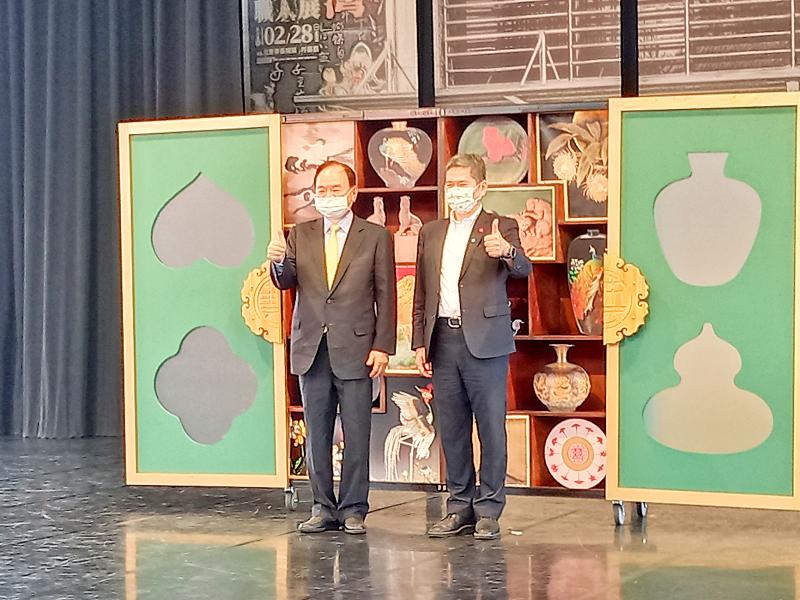PX Mart Co Ltd (全聯實業) chairman Lin Ming-hsiung (林敏雄) on Wednesday said that both RT-Mart International Ltd (大潤發) and Carrefour Taiwan (家樂福) had approached him with sales offers.
Lin told local media on the sidelines of a public event that both companies had asked about the supermarket chain operator’s interest in buying them out. He declined to comment further as the topic is sensitive, local media reported.
Lin made the remarks at the inauguration of the Gallery of Taiwan Traditional Art (巧藝館) at the National Center for Traditional Arts’ (國立傳統藝術中心) Yilan campus. The gallery is sponsored by Pxmart’s Sunmake Cultural Foundation (全聯善美的文化藝術基金會).

Photo: Chiang Chih-hsiung, Taipei Times
Carrefour Taiwan in February acquired Wellcome Taiwan Co’s (惠康百貨) chain of supermarkets and the upscale Jasons Market Place stores. The deal left Carrefour with 66 big-box hypermarkets, 262 supermarkets and 25 Jasons Market Place stores.
Lin said the fact that Carrefour and RT-Mart are looking to sell their Taiwan operations highlights the challenges the grocery sector is facing, adding that if only the biggest player can survive in the market, it is not a good market, the local media reported.
PX Mart, which operates as Pxmart, has 1,055 stores in Taiwan. The company plans to expand to 1,068 stores by the end of the year, and forecasts revenue of NT$150 billion this year, Lin said.

Semiconductor shares in China surged yesterday after Reuters reported the US had ordered chipmaking giant Taiwan Semiconductor Manufacturing Co (TSMC, 台積電) to halt shipments of advanced chips to Chinese customers, which investors believe could accelerate Beijing’s self-reliance efforts. TSMC yesterday started to suspend shipments of certain sophisticated chips to some Chinese clients after receiving a letter from the US Department of Commerce imposing export restrictions on those products, Reuters reported on Sunday, citing an unnamed source. The US imposed export restrictions on TSMC’s 7-nanometer or more advanced designs, Reuters reported. Investors figured that would encourage authorities to support China’s industry and bought shares

TECH WAR CONTINUES: The suspension of TSMC AI chips and GPUs would be a heavy blow to China’s chip designers and would affect its competitive edge Taiwan Semiconductor Manufacturing Co (TSMC, 台積電), the world’s biggest contract chipmaker, is reportedly to halt supply of artificial intelligence (AI) chips and graphics processing units (GPUs) made on 7-nanometer or more advanced process technologies from next week in order to comply with US Department of Commerce rules. TSMC has sent e-mails to its Chinese AI customers, informing them about the suspension starting on Monday, Chinese online news outlet Ijiwei.com (愛集微) reported yesterday. The US Department of Commerce has not formally unveiled further semiconductor measures against China yet. “TSMC does not comment on market rumors. TSMC is a law-abiding company and we are

FLEXIBLE: Taiwan can develop its own ground station equipment, and has highly competitive manufacturers and suppliers with diversified production, the MOEA said The Ministry of Economic Affairs (MOEA) yesterday disputed reports that suppliers to US-based Space Exploration Technologies Corp (SpaceX) had been asked to move production out of Taiwan. Reuters had reported on Tuesday last week that Elon Musk-owned SpaceX had asked their manufacturers to produce outside of Taiwan given geopolitical risks and that at least one Taiwanese supplier had been pushed to relocate production to Vietnam. SpaceX’s requests place a renewed focus on the contentious relationship Musk has had with Taiwan, especially after he said last year that Taiwan is an “integral part” of China, sparking sharp criticism from Taiwanese authorities. The ministry said

US President Joe Biden’s administration is racing to complete CHIPS and Science Act agreements with companies such as Intel Corp and Samsung Electronics Co, aiming to shore up one of its signature initiatives before US president-elect Donald Trump enters the White House. The US Department of Commerce has allocated more than 90 percent of the US$39 billion in grants under the act, a landmark law enacted in 2022 designed to rebuild the domestic chip industry. However, the agency has only announced one binding agreement so far. The next two months would prove critical for more than 20 companies still in the process